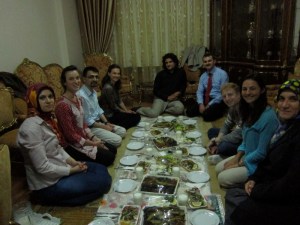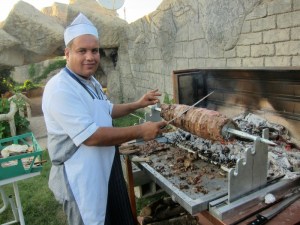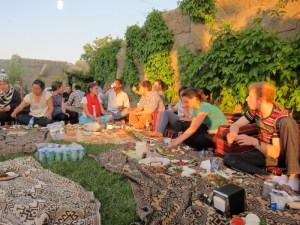by Ali Friedman
Where I’m from there’s a well-known custom we like to call ‘Southern hospitality.’ Much to my and my fellow Southerners’ delight (I’m talking about Nathan, Rae, and Raffi), Southern hospitality extends to our current location in the southeast of Turkey.
Upon the group’s arrival to Şanlıurfa, we piled into a mysterious, low-lit cellar with tables elevated just above the ground surrounded by cushions and stacked with a breakfast that included multiple plates of cheese, tomatoes, cucumbers, eggs, pide (flatbread), olives, nuts, pastries, etc. After five days in Urfa, I almost find it unnecessary to mention the endless curved glass cups of çay (tea) that followed our first feast and that would also accompany every single meal and meeting here. At this time however, we were unaccustomed to such practices and our hosts’ laughter at our Western astonishment intermingled with the twang of a sitar-like instrument playing in the background.

We weren’t in Istanbul anymore.
My suspicions of this unusually high level of Turkish-style Southern hospitality were soon confirmed. During our four nights here, we have subsequently been welcomed into the homes of four amazing families.
On our first night the group split in two, separately making our way to the homes of two Urfan families, unaware of the warm welcome to come. Turning the corner into the dining room post-removal of shoes, my heartbeat quickened and my eyes widened as a literal banquet of traditional Urfa kebap, chicken şis, roasted eggplants, onions, tomatoes, hot peppers, salad, çorba (lentil soup),ayran (yogurt drink), spices, cilantro, parsley and even more bread radiated deliciousness before my humbled being.

We sat down to eat Urfa-style, cross-legged on a carpet on the floor, throwing a mix of kebap, spices, peppers, and a variety of other foods into a wrap-style bread and then rolling it all together burrito-style. Unimpressed with our skills, our hosts generously made döner rolls for us and assured us that this lavish welcome exemplified standard Urfa tradition.
We laughed and ate heartily, unaware that our hosts would soon goad us into eating as much as possible. Now a daily occurrence, we found ourselves food-comatose, yet again ignorant to the many cups of çay and plates of şillik (a crepe-like dessert filled with walnuts and drenched in syrup) to follow. At this point a commendation of our courageous translator Mustafa is necessary, who, as one of two Turkish guests, received the brunt of the Urfa force-feeding and managed to translate for 3 hours straight.

This behavior continued each time we entered a southeastern household, with variations of baklava, lahmacun (Turkish “pizza”), yogurt salads, rice dishes, and a lamb roasting on a spit making various appearances in a village leader’s home, an imam’s office, and an eye surgeon’s country house, respectively. The conversation matched the food, as Turkish and American politics and culture were discussed with questions from both parties. An invitation to return (and to visit our homes) accompanied every single goodbye.
But Urfa hospitality in no way is contained to the home. Everywhere we go people smile, attempt to exchange a few mutual Turkish and/or English words, and even sometimes give us free goods (like marbled paper)! The tangible friendliness in the Urfan air has not escaped us, so much so that we have now added a çok to our most frequent Turkish saying of teşekkür, changing “thank you” to “thank you very much!”

Çok teşekkür, Urfa! You have outdone even the most hospitable displays of Southern hospitality as we once knew it, and I for one do not know what I will do without the warmth of the people or the endless trays of kebap, baskets of pideand cups of çay.
I am proud to report that just as in the U.S., the South is the place to be in Turkey.